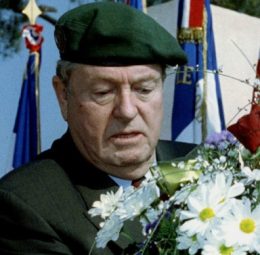A Voice in the Wilderness
Posted By Jean-Marie Le Pen On In North American New Right | Comments Disabled750 words
Translated by Guillaume Durocher
Translator’s Note: The following is a translation of the final paragraphs of the first volume of Jean-Marie Le Pen’s Mémoires: Fils de la nation (Paris: Muller, 2018), pp. 402-403.
. . . in the end, the Second World War is a detail of history and a detail in the use of history for ideological ends.
Today, it’s all of Europe’s history which is the subject of a great lie, and of an enormous inversion whose objective is, in my opinion, to inculcate – along with repentance – hatred of one’s self, of one’s lineage, and of one’s education, justifying non-resistance to the invasion, to the great replacement, and to decadence. Worst of all is that they target the young, the weak, the children, and the adolescents toward this end, who are roped in by the public education system.
Well, for me this is a crime. To deracinate the young, to set them against those who made them and what made them – that is a crime against all of human history. For me, all my predecessors were not the monsters whom they like to describe as such. On the contrary, I feel that I am their heir. Maurras was right: The child who is born French will never be able to give back to his country one one-thousandth of what he owes her. He owes her his life, education, protections, habits, and customs: the very landscapes through which he travels without glancing at them were fashioned by his forefathers.
Since Mitterrand, the general opinion is that we should “go beyond history.” In my case, I think that we need to continue history. I counter the mullahs of utopia and their infernal tabula rasa with the duty of piety towards one’s forefathers and one’s fatherland. The fourth commandment. My filial piety is my French consciousness. Our country’s traditions and the natural order are not a web of errors. On the contrary, it is disobedience against our fundamental principles which is causing the decadence from which we are dying, and which is calling forth our replacement. Against the criminal parody of history engaged in by Emmanuel Macron, when he asserts that France committed a “crime against humanity” in Algeria, and so much other nonsense which he luxuriates himself in, I feel the duty to defend – with intelligence and truth – my country.
Just so you know, I don’t really care about my bad reputation according to this yardstick. I know how the trumpets of fame sound, and I couldn’t care less. I know that it is bad to shake the hand of Léon Degrelle and not to send Faurrisson to jail. The system’s lady patronesses, since Alain Duhamel,[1] [2] have explained to me quite sufficiently that this was detrimental to my future. And, by God, if I had listened to the hall monitors when I was a young independent MP following the Giscardian[2] [3] career path, I would have ended up being a minister, maybe even a president. The Gaullists, by the way, proposed that I join them in 1962 – after all, I had not participated either in the putsch nor in the OAS.[3] [4] But – thank goodness for me – I was in no way attracted to these opportunities for sweetness, honorary positions, and greed.[4] [5]
If I had meaning, it was in shouting the truth, in season and out of season – as did my patron, Saint John the Baptist – to be the voice which refuses lies, the voice which comforts and lifts up the sick, humiliated, and insulted people. Politics, after all, may not have completely been my thing. I was rather – how to say? – a watchman, a sentinel, a whistleblower, the head dog who senses that the sleigh is heading towards a crevice,[5] [6] a pain in the ass, a shit-stirrer,[6] [7] a prophet? A voice, who cries in the wilderness until it is answered.
Notes
[1] [8] A prominent journalist who has worked in television since the 1970s.
[2] [9] A liberal-conservative politician who served as President of France between 1974 and 1981.
[3] [10] The putsch des généraux of April 21, 1961, in which four French generals in Algeria sought to topple Charles de Gaulle’s government, rightly fearing that he would abandon the colony and its population of one million European settlers. The Organisation de l’Armée secrète (Organization of the Secret Army, or OAS) was a dissident paramilitary organization which sought to keep Algeria French through violent actions against the French government.
[4] [11] My very tentative translation of couche molle.
[5] [12] Compare Céline [13]: “I may have had the subtlety of a [barking] sled dog [une chienne]. No more.”
[6] [14] Emmerdeur.
